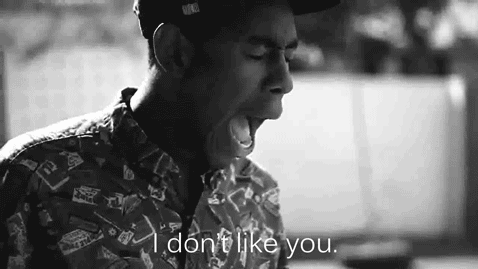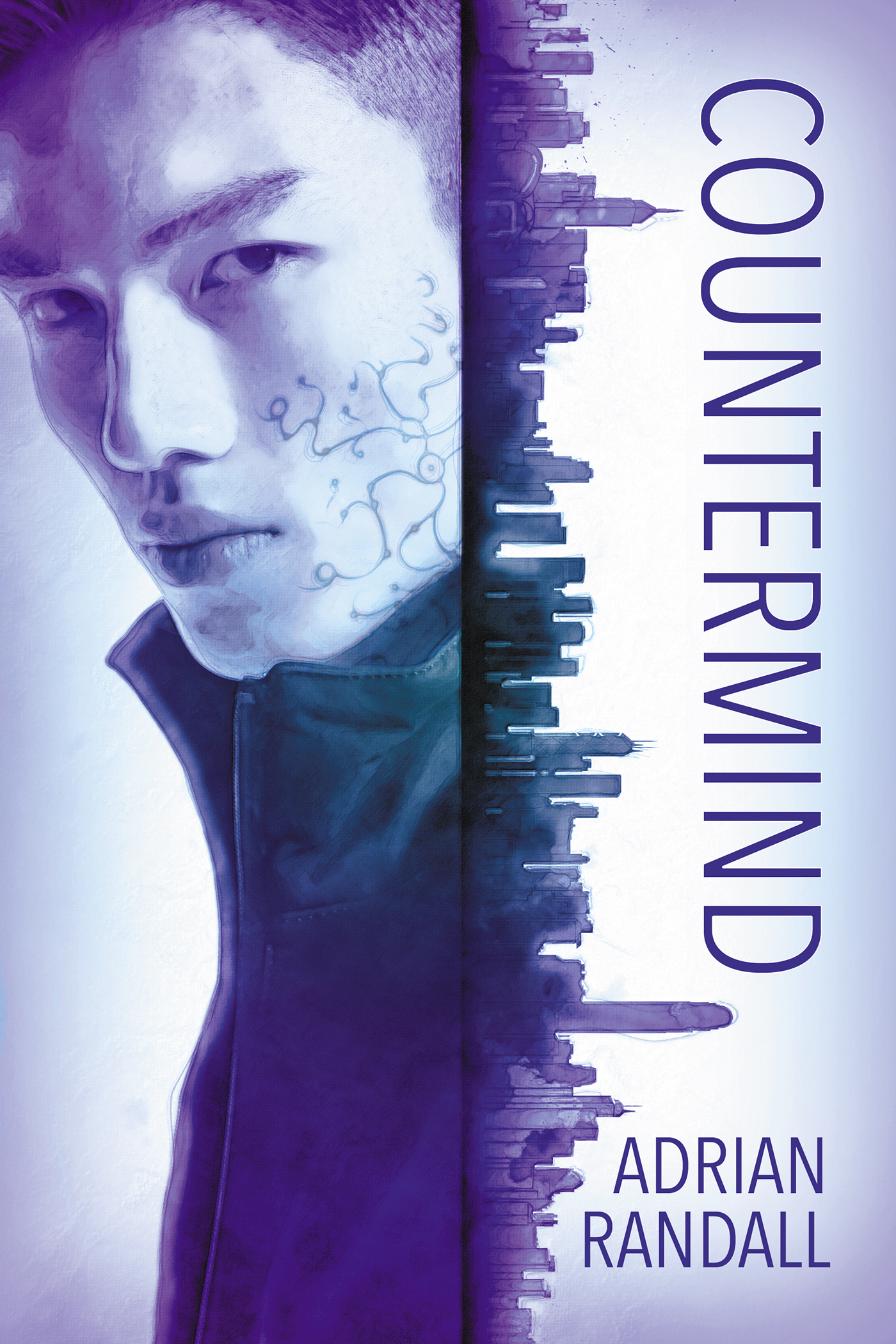 Title: COUNTERMIND
Title: COUNTERMIND
Author: Adrian Randall
Genres: Adult M/M Romance; Science Fiction; Suspense
Publisher: DSP Publications
Publication Date: February 28th, 2017
Rating: No Rating; DNF @ 15%
Links: Amazon | Amazon UK | B&N | iBooks | Kobo | Publisher | Goodreads
This review is going to be disjointed because this book, for what I read of it, was disjointed, and I’m having trouble stringing my thoughts together in a logical progression. Because of professional boundaries I try not to write long reviews for DNFs and I’m definitely not going to star rate this, but this book has some bad representation in it that hurt to experience, and that’s the one area where that rule relaxes for a more extensive review – if only for the sake of saving others from being hurt by bad rep. Which means I’m going to have to discuss my other issues with the story as well, because you can’t extricate issues with characterization and storytelling from overall representation with marginalized main characters.
I tried to stick it out with COUNTERMIND. I really, really wanted to like it; even knowing going in that it’s not #ownvoices, I wanted to give it a fair shake because it really sounded up my alley, from the near-future noir-ish science fiction to the Asian setting and protagonist. Asian rep, particularly queer Asian rep, in books is so hard to find that I really, desperately wanted to love this and say all the good things about it. Plus that cover is beautiful, and it’s rare that we see well-done covers with Asian models – though considering L.C. Chase is the cover artist, I’m not surprised by just how lovely the cover came out. But nonetheless I quit at 15% in after taking two full pages of cramped, hand-written notes of all the reasons why I wanted to throw this book at the wall until my Nook shattered. Some of this was physically painful to read, to the point of being bloody well racist when it wasn’t just plain lazy or offensive.
So, brief summary: some humans now come in various flavors of psychic, and basically psychic activity is illegal unless used for government-sanctioned purposes. Alan Izaki is an unregistered psychic, a scrapper and a thief of unique capabilities, possessed of damning secrets, on the run from government psychic policing agency Countermind and powerful psychic agent Jack Smith.
From the very first page of the prologue, the settings – from Bangkok to Hong Kong – felt uncomfortably Western. There was no sense of familiarity with or understanding of diverse Asian cultures and nuance present in the settings; just place names thrown about without capturing the feeling and character of a location. It could’ve just as easily been the slums of Los Angeles as the slums of Hong Kong. I felt like I was reading less about a modern, Western-influenced Asian setting and more about the most gentrified block of New York’s Chinatown. It’s not 海鲜雀巢; it’s mall food court moo goo gai pan. There was no life to it, no presence, and no real idea of sensory depth.
The prologue opens on three boys with…I’ll call them pseudo-Thai names, as they’re not really common in Thai culture (or used at all) and border on someone naming their kids L’mongelo and O’rangelo; there’s a reason these names are listed as uncommon when you look them up on Babynames.com: not because they’re special, but because they’re just weird names to give your kid. Maybe Siam could’ve been Indian (though it’s just odd to have a kid named Siam in a country that used to be called Siam, and I’m just…skeptical), but since Jettrin and Jai are brothers and Jettrin is a (very uncommon) Thai name, I guess…Jai is supposed to be as well? These characters were difficult to empathize with, and I felt like I was reading about three young white American boys with no idea why. This feeling continued in chapter one, as we left these boys behind (for good? Why did the prologue open on them?) and met “the agent and the thief,” which is how we first come to know, well before we know their names, the two men I presume will be our romantic pairing. I don’t know. I didn’t stick it out long enough to be sure if Jack and Alan hook up; by 15% all I knew was that I didn’t like either of them, and felt no chemistry between them despite both men acknowledging to themselves that the other is attractive.
Alan in particular was a problem. Japanese and yet with nothing to make him distinguishably Japanese, nothing in his thought patterns or habits to indicate that he has any connection to Japanese culture or awareness of his lack of connection to Japanese culture, which is something that is often a pivotal part of the identities of later-generation Japanese Americans raised in an entirely Western environment as it’s hinted that Alan was. Does he understand the significance of shouganai? Does he know what it’s like to be The Only Asian in a Western school and expected to represent pretty much Japan, China, and Korea (and sometimes Vietnam, Thailand, Laos, etc.) in one even though he’s only one of those and wasn’t actually raised in his home culture? Does he feel the hurt of the sharp dividing line drawn between Nihonjin and Nikkeijin? When dealing with Chinese people, does he ever feel the sting of post-occupation resentment and loathing that still lingers after all these years, especially among mainland Chinese? How does he navigate the complexity of being Japanese among heavily Cantonese populations in Hong Kong? Is there anything about his life at all that’s been impacted by being a Western-raised Japanese person? Anything where I don’t have to get through the first fifth of the book to actually find something that makes me feel like I’m reading a Japanese POV? I’d have taken one little thing. Anything.
I got nothing. Not just on the cultural front, but on Alan as a person with a defined sense of self, emotions, clear voice and personality, an established sense of himself in the world. He was just a collection of data, but none of that data included anything that alluded to his ethnic background.
In fact, since we don’t learn his last name is Izaki until later (and by then I had forgotten the blurb, and you shouldn’t need the blurb to convey character details your book should cover front and center), I wasn’t sure if he was white, Chinese…he could’ve been Brazilian. I just…didn’t know, despite the fact that on first meeting him he takes a pause to lovingly describe himself, his tattoo, his clothing, and current fashion trends for the reader in the middle of a high-tension situation.
What bothered me the most about Alan, though, was that I had no reason to care about him. From the start, I at least understood Jack’s purpose even if we’d not yet delved far enough to understand his motivations; he has a job to catch psychic criminals, and he’s going to do it. He’s failed in his first attempt to catch Alan and gotten himself roundly injured in the process, which creates pathos and a strong reason for his determination not to fail again. Alan…I don’t know why he does what he does, or what he wants as driving character motivation other than to continue to survive and evade Countermind. His scenes felt pointless without that knowledge, especially when interspersed with scenes introducing so many characters that by 15% I’d lost count of how many we’d met or what role they were to take. Alan himself is as shallow as an on-brand idoru whose entire existence is a collection of concepts that haven’t quite achieved unity, a living male Hatsune Miku with just as much depth, but then that shallowness is something that pervades this story. From the beginning I didn’t feel connected to the characters; it felt like the author was trying to hook readers quickly with immediate action and intrigue, but without at least a glimpse of character depth it mostly felt like watching random people do random things in an action film without caring about the outcome.
I know some other reviewers had a problem with the enormous technical infodumps. I…actually didn’t, and they were what kept me reading hoping that it would get better, enough for me to at least give the book three stars. I love the science of a story, especially around neuroscience, data technology, cryptography, etc., and I was quite interested in the technological worldbuilding overall. I did, however, have a problem with the writing used to convey that worldbuilding. It was disjointed, disconnected, and didn’t seem to know if it wanted to be third limited or third omniscient, and on one occasion I felt like the author broke the fourth wall to speak directly to me as the reader. There were so many instances of telling vs. showing that it felt like the author was struggling not to break POV but still wanted us to know how the non-POV characters felt, and didn’t know how to portray that in a way the reader would innately pick up through gesture, tone, body language, expression. Basic issues with sentence structure, with self-description…the writing just wasn’t there, as far as style and maturity. And while the technical infodumps were interesting, they came at the wrong moments and without a natural flow that would make them blend seamlessly into the narrative and connect them with character actions in a way that might move the story forward. As a whole the style was uncomfortable to read; I don’t know if it was trying to be smart while remaining accessible or trying to be accessible while remaining smart, but in trying to straddle both it accomplished neither, and significantly weakened any sense of character voice.
As far as the representation, I took enormous issue with how several of the non-POV Asian characters were described, and this was what made me stop struggling with the book and decide to move on because this was making me feel bad – small, cheapened, uncomfortable. In trying to impart some level of cultural familiarity, the author seemed to fall back on stereotype. For instance, when meeting Executive Director Zheng, the only “notable decoration” in his office was “a framed piece of brushwork calligraphy.” Which…isn’t wholly out of character, fuck, I have brushwork calligraphy in my home, and yes, it’s above my little vase of lucky bamboo. But the translation made me groan.
He who knows and knows that he knows is a wise man.
The craft of hanzi brushwork (shūfǎ, and gah this font that won’t display the pinyin accent mark correctly) is beautiful, subtle, and often used to convey many things – from a silently impactful single-word character to the length of a poem or even a complete story that’s told as much in the writer’s unique calligraphic style as in the meaning of the hanzi themselves. It’s an art form, and it could have been used to impart quietly meaningful character depth.
Instead the story fell back back on something that practically came out of a pithy pocket book of cheap Confucianisms.
Except this one can’t actually be reliably traced to a source as a Chinese proverb, and might actually be Arabic, Sanskrit, Persian, or just one of those modern truisms that we’ve falsely attributed to some ancient source to give it more weight. I can’t find a reliable, even semi-credible source for it anywhere except for the Lady Burton crediting it as an Arabic Proverb in the biography of Sir Richard Burton (source). The clip used in COUNTERMIND isn’t even the full proverb; Goodreads attributes the full proverb to Confucius and The Analects, but I’m honestly not sure how much I trust that. If it is from The Analects, then my comment about stereotypically pithy Confucianisms is even more on the nose and… *facepalm* I’d almost rather it be an Arabic proverb, strangely planted in a Chinese setting, written in Chinese language, contextualized in a way that would mislead the uninformed reader into thinking it’s Ancient Chinese WisdomTM. Either option is just a mess. We either have bad research or bad stereotypes, and I kind of don’t want either. (Aside: this was bothering me so much I downloaded The Analects of Confucius after I finished the bulk of this review, and I can’t find this proverb anywhere in the book. Maybe I have a different edition. ¯\_(ツ)_/¯)
I mean…yes, there are hanzi paintings that do, in fact, depict these little fortune cookie bon mots, many of them actual Chinese proverbs. But there were so many other options. So much more that could’ve been done with that. So many opportunities left untapped. The choice made here is rather telling, and rather disappointing.
Especially when that little adage, then, is used to characterize Zheng; after yet another physical description – most characters are reduced to that, with very little presence or charisma to truly define them as complex beings that we care about – we’re told that he doesn’t look the part of a classical wise man, but Smith knows he has the brains of one.
Do I really need to tell you how frustrating it is that the first notably Asian character we meet (as we don’t actually get confirmation that Alan is Asian until after this) is characterized as the wise man? The forbidding sage of the mountain, even if Zheng’s mountain is an office dominated by mahogany, brass, and leather, looking out over a city that, through the fogged window, leaves impressions of the classic three spatial depths of Chinese and Japanese screen and landscape paintings – which, if intentional, was clever, but by this point I’m not certain it was when I might’ve just been looking for something to grasp onto so I wouldn’t start thumping my head on the coffee table over Zheng. There were a thousand ways to imply Zheng’s gravitas and make him a unique character without falling back on that, but…here we are.
There’s also an entire discussion in here on the art of cultural subtlety and how we wouldn’t be so obvious…but this is getting long enough as it is.
I’m not going to touch on Arissa binti Noor much, because I’d just be saying essentially the same things I did about Alan: that giving a character an Asian name does not make them Asian, or make their voice an Asian voice, and there is nothing in her scenes that even brushes up against the fact that she might be Malaysian except naming conventions and brief mention that she speaks Malay (called Malay in the book, not Bahasa Melayu, from her POV). Of course characters don’t need to go about loudly signaling their ethnicity on first meeting, but the thing is…there’s a difference in how you perceive and describe your world and yourself when you grow up speaking languages that aren’t English, in worlds that don’t default to the standard template of the West; there’s a different social framework that governs everything from the smallest polite interactions to the most high-conflict situations. And there’s nothing to hint at that in any of these character voices, nothing that articulates this difference in worldview – a difference that should be diversely and differentially portrayed when in just a short space we’ve encountered Japanese, Chinese, and Malaysian, and each will have a different framework. It should be there in the little subtleties, in how their inner narrative works even when they aren’t outright proclaiming “this is my culture”…but it’s not.
But moving on…next we get to Alan’s ongoing efforts to collect data to steal someone’s identity for the purpose of escaping Hong Kong after his first bad brush with Jack Smith and Countermind. He’s looking for someone who looks enough like him that he can pass himself off long enough to escape without leaving a trace that either psychic or non-psychic police would be able to follow; in doing so he settles on a “scion of an established Jiangxi political family.”
*sighs, rubs temples* So, for those of you who don’t know…Jiangxi is a province in southeast China. I mean…I’m already like…um…Jiangxi is one of the more highly distinct regions of China with more prominently unique dialects and culture differentials so it’s kind of hard to just throw a dart at a map and just say “Oh, sure, Jiangxi,” and have it be as good as anywhere else, but okay, this is an alt-universe future, sure, we’re just looking for a young man who repeatedly travels between Hong Kong and Shanghai, wasting his rich Jiangxi parent’s money on living the high life, it’ll work. (Though I did wonder if the author was confusing Jiangxi with Jiangsu, which is actually adjacent to Shanghai and would make a little more sense for someone who repeatedly travels to and from Shanghai…but I’m giving the benefit of the doubt there since Shanghai is a massive global hub of finance, trade, culture, and entertainment, and would definitely be a hot spot for any young wealthy Chinese jetsetter regardless of their family’s point of origin.) But…then we get to this young scion’s name.
Kim Kyung-Min. Or Kyung-Min Kim, if you write it in the Western order.
Y’all.
Kyung-Min is a Korean given name.
I mean, I was willing to forgive the guy named Chun-Wai written with the hyphen instead of as Chun Wai as there are different accepted rules for hyphenating romanized Chinese two-part given names (though P.S. If you’re writing Zheng instead of Cheng you’re using Hanyu pinyin, but hyphenating two-character given names is Wade-Giles, so consistency would be nice), but either there needs to be some kind of plausible explanation in the worldbuilding for this Jiangxi scion to be Korean or you need to show me a real live Chinese person from Jiangxi named Kyung-Min. I don’t care if they’re Hakka or Gan or what, just show me, because no. Nope. Like are we Cloud Atlasing this thing and the South Koreans just took over everything when hallyu/the Korean wave turned into world domination, so most of China is Korean now?
But the final kicker with Kyung-Min is that whether he’s Korean or Chinese (or mixed-race, please let him be mixed-race to explain that), he’s supposed to be such a spitting image of Alan – Alan Izaki, Japanese – that they could’ve been related.
But he bore such a resemblance to Alan that he had to wonder if he’d discovered a distant cousin. Kim’s expression in the photo was serious and analytical. Though his haircut was shorter and tidier than Alan’s, and he wore glasses and a button-down shirt and tie, the delicate features were in such a similar mold to Alan’s that they provoked a frisson of narcissistic attraction.
*drags hand over face* Ignoring that this really isn’t endearing Alan to me any further…if in 2017 I need to tell you that all Asians are not interchangeable or related by blood…FOH. Various East Asian ethnicities have entirely different features, ranging from the shape of monolids and inner eye folds to overall facial contours, feature placement, proportions/ratios, etc. Our skin tones possess notable differences. What’s even considered attractive from one East Asian culture to another differs. Generally, we can tell each other apart. The fact that other people can’t is beyond insulting, but when it’s used as a plot point to basically throw out the old “oh, all Asians look alike” in a book from the POV of a Japanese character…that was an Iron Fist right to my gut, and I shut the Nook down because I just didn’t want to read another word. Maybe later Alan’s actually caught out on the fact that you can’t pass a Japanese man off as Chinese or Korean in Hong Kong, but frankly unless I’m training as an MMA fighter I don’t want to willfully keep getting punched in the face in the hope that the punching eventually pays off in cookies and sunshine – so I’m not going to keep reading to see if this mess untangles itself. This was my break point, and I’m not spending another page on a book that hurts like this; if it managed to pack this much no-thank-you into 15%, I don’t want to know what the other 85% will bring, particularly if this is the foundation it’s built on.
Overall, this book was just…soulless. I went in hoping for something that would let me feel a connection to a protagonist like me, and came away frustrated, disappointed, and hurt, while feeling like Alan was less a person and more a fetish object who even fetishized himself; the book took fictional liberties with real cultures without having a solid grasp of those cultures in the first place, resulting in problematic representation. If you want solid East Asian rep that isn’t offensive, stereotyped, or damaging, then COUNTERMIND is not the book for you.
Publishers, please, if you’re going to commit to diversity, seek out #ownvoices before you settle for harmful representation from outside cultural perspectives. And if one of your authors is writing outside their lane, make sure your editors fact-check and research diligently – and hire a sensitivity reader who will catch all of this before it goes to print.
Hard pass. DNF, and moving on to better things.
AUDIO READING
I almost didn’t do an audio reading for this one since it was a DNF and the representation was so problematic, but I did like this one description and I might as well give y’all something fun to take away from this. Plus I used this one as my warmup practice to make my voice stop sticking in my throat for the first batch of recordings. So…here.
 |
   |
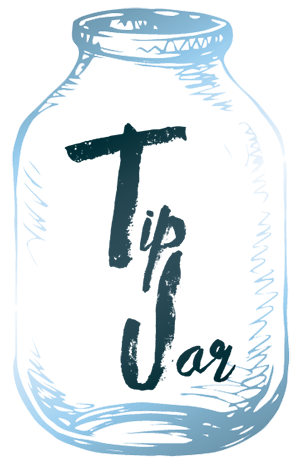 |
RECENT REVIEWS
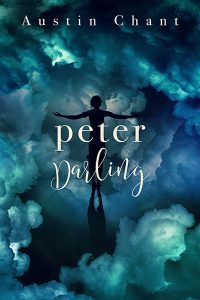 5 STARS: PETER DARLING 5 STARS: PETER DARLINGAustin Chant’s fascinating PETER PAN reimagining takes us back to a Neverland that envisions Peter as a transgender hero – who’s all grown up and suddenly seeing Captain Hook and the entirety of his childhood dreams in a new light. [Read the full review] |
|
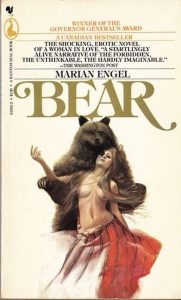 3 STARS: BEAR 3 STARS: BEARI read it for the lulz and I’m not sorry. This Canadian literary novel is a riot of holy hell and bear cunnilingus that will leave you asking “what in the actual fuck, Canada?” for 121 pages. [Read the full review] |
